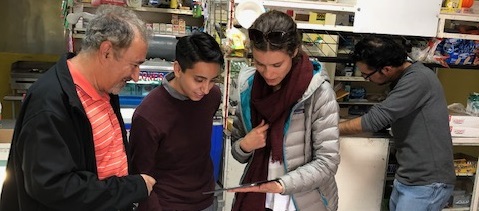Manomet’s Grocery Stewardship Certification (GSC) started in New England, but is now found in 21 states. In October 2018, New Mexico became the most recent state with grocers working with the GSC. The GSC launched a new collaboration with New Mexico State University’s (NMSU) College of Engineering and their Engineering New Mexico Resource Network (ENMRN) in Las Cruces, NM, to help small, independent grocers in southern New Mexico boost their long-term viability through sustainable operational practices.
ENMRN has a long-standing history of working to help New Mexico business owners address operations that reduce their environmental impact through pollution prevention resources and official energy efficiency audits making them an ideal partner for the GSC.
“This is a tremendous opportunity to strengthen our regional reach through data-driven sustainability practices,” says Patricia Sullivan, associate dean of outreach in the NMSU College of Engineering. “Having grown up around the grocery store business, I am excited to support this effort to foster sustainability and cost-savings, especially for rural and independent grocery stores.”
The partnership is possible thanks to the USDA’s Rural Business Development Grant program. The goal of the partnership is to provide in-depth on-site technical assistance to rural New Mexico grocers to boost their profit margins through the best management practices outlined through the GSC’s workbook. Each independent grocer will receive a report outlining their current savings as well as potential opportunities for more savings, and a list of recommendations with low hanging fruit as well as bigger investments. ENMRN will deliver the reports and assist in connecting the New Mexico businesses with resources to help make those investments, as well as drum up local community attention on each business’ efforts to be a better neighbor.
In October, I traveled to Las Cruces to train a group of NMSU ENMRN staff, a group made up of undergraduate, graduate, and doctoral level engineers, on how the GSC program is structured and operates. Over the course of two days, six New Mexico independent grocers were enrolled in the program through on-site visits filled with technical assistance. Store managers and owners were shown what they were doing well, and also areas of opportunity to save more money and resources.
In addition to the energy, water, waste, chemicals, and employee engagement already focused on in Manomet’s GSC program, a unique aspect of the new partnership will address the issue of food deserts. According to the USDA, food deserts are areas that are void of fresh vegetables and fruits, whole grains, and low-fat dairy products, all key ingredients to maintaining a healthy body and preventing disease. In New Mexico, one third of the state’s counties qualify as low food access or food deserts, according to the USDA and CDC definitions. NMSU’s Cooperative Extension program’s Institute for Cooking and Nutrition (ICAN) will work with these grocery stores, which often act as the hub for their communities and the health of the community members, on how to provide more healthy and affordable options.
The GSC team hopes this model of partnership will be replicated in other parts of the country. Already, there is another partnership in New Jersey with Rutgers University’s Eco Complex, working with students and faculty to address grocery and food sustainability within the state. The GSC team looks forward to strengthening the-long term future of these crucial businesses and the impacts they have on their communities and the health of the people living there.





 Back to all
Back to all

